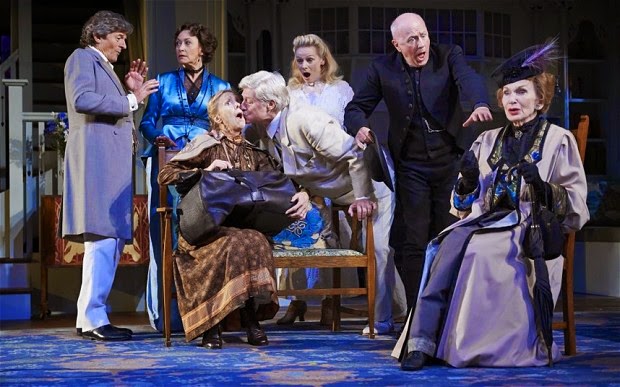Reviewed by James Karas
Julius Caesar seems
superbly suited to the production style espoused by Shakespeare’s Globe
Theatre. The stagings in the “replica” of the original Globe Theatre on the
South bank attempt to emulate as much as possible or is known of the theatrical
practices of the Elizabethan era.
One of the practices was robust
interaction with the audience, especially the groundlings or yardlings as they are
called now, the several hundred people standing around the stage. Julius Caesar begins with a full-blooded
scene with the Roman rabble but this production does not wait for that. There
are people in Elizabethan costume mixing with the audience inside and outside
the theatre before the performance begins.
When the performance starts,
Director Dominic Dromgoole makes full use of the audience including having a
number of exits and entrances through the middle of them. The antics of the
Roman rabble amid the yardlings enhance the production without taking anything
away from the fine performances.
Tom McKay plays an excellent
Brutus. He is young, intense, with a fine voice and superior delivery of
Shakespearean poetry. You sense Brutus’s strength, intelligence and decency
even if he lacks Cassius’s cunning. The latter, played by Anthony Howell, has
cunning and conspiratorial flair and one is never sure if his expression of love
for anyone is genuine.
Luke Thompson fits the
description of Mark Antony as the shrewd playboy who manages to arouse the
rabble to mutiny. He does a great job in “Friends, Romans, Countrymen lend me
your ears” but he shows scant emotion of first seeing the butchered Caesar.
Joe Jameson, like most of the
cast, takes on several roles, but he is most notable as the petulant and
arrogant Octavius.
I found George Irving’s Julius
Caesar somewhat subdued, especially in an original practices production. I
expected his arrogance to be more pronounced. He is murdered by the
conspirators not for what he has done but for what he might do because of his
overweening ambition. The latter was not sufficiently emphasized.
The murder of Caesar is surely
one of the most famous scenes in history, especially as staged in productions
of Shakespeare’s play. The conspirators stab Caesar and the blood-drenched man
turns towards Brutus, the man he admires and loves like a son. He utters the
short Latin phrase that has reverberated down the centuries as the ultimate
expression of supreme betrayal: Et tu,
Brute. Caesar says these words upon seeing Brutus but before he is stabbed
by him. I think that reduces the effectiveness of the scene. It is possible
that Brutus was not going to stab Caesar and the scene would be more dramatic
if Brutus stabs him first and Caesar spouts the words in utter shock. After
that there is nothing left but for him to fall and die.
This is a solid production
despite the rambunctiousness of the crowd scenes. There is scant comedy in Julius Caesar and no comic character as
such.
There is one touch that merits
mention. In the final scene, Brutus has his servant Strato hold a sword and he
runs onto it to meet his death. Quite sensibly, there is no running onto a
sword in this production for fear that it may look ridiculous. But the Strato
is played by the same actor who played Caesar. Thus there is an added poignancy
when in his final words Brutus says “Caesar, now be still.”
__________

















